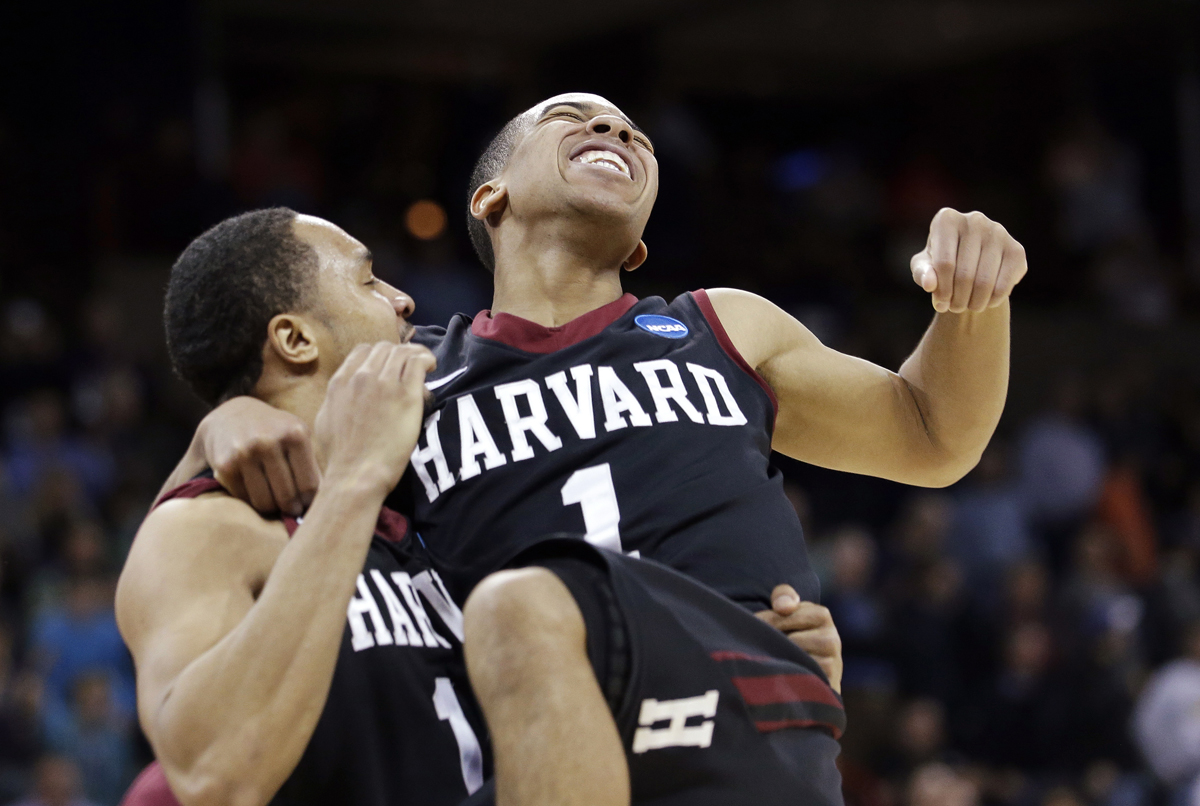Sorry, Harvard Basketball Is Definitely An Underdog

Photo via AP
When Harvard beat Cincinnati on Thursday, the win prolonged a streak of seven straight NCAA Tournaments in which a 12 seed has upset a 5 seed to advance to the Round of 32.
In fact, since the NCAA Tournament field expanded to 64 teams in 1985 (now 68), a 12 seed has recorded a first-round victory in 27 of those 30 years. And in light of two more victories on Thursday, the seed’s sustained success even has some calling for the end of the “underdog” label being applied to 12 seeds at all.
Let’s all make a pact, OK? Blood oath. For the rest of time, there is no such thing as an underdog. Sure, there are teams with more talent than others. Chances are good that North Dakota State or Harvard won’t send five players to the NBA. They might not even send one.
They don’t play in powerhouse conferences, and you won’t see them on national TV until March almost every year. These teams we insist on calling mid-majors get no recognition during the first five months of college basketball season. Then for a week they become our obsession, and cost us all $1 billion.
But really, we shouldn’t be surprised when they pull off an “upset.” In fact, we shouldn’t even really call it an upset. Since 1985, 43 12-seeds have won their round-of-64 games in the NCAA tournament. Nineteen of those 43 No. 12′s have won their first game since 2004, and seven have won in the past three years.
Seven out of 12. That’s what those nerds at Harvard call a majority.
Has the 12 seed become a disproportionately strong tournament team given its pre-tournament evaluation? Not really, as it turns out. While 12 seeds have been remarkably consistent knocking off five seeds on a yearly basis, they’ve won the same number of first-round games as 11 seeds and have fared worse in the tournament overall. (11 seeds have an all-time tournament record of 69-136, while 12 seeds are 67-137 since 1985.)
But while 12 seeds do not win more games than the teams seeded just ahead of them, they have had considerably more tournament success than the teams slated behind them. 13th-seeded teams have won just over 20 percent of their games compared with the 33 percent mark of the 12 seed. However, considering 12 seeds have lost twice as many games as they’ve won in the NCAA Tournament, it seems appropriate to continue to grant them underdog status.
What does all of this tell us about Harvard’s chance of making a deep tournament run? If history is any indication, the Crimson’s chances of advancing to the Sweet 16 are similar to their pre-tournament odds of beating Cincinnati. In fact, 12 seeds that have advanced to the Round of 32 have beaten the winner of the “4-13” matchup more than 45 percent of the time (20-44). However, 12 seeds are 8-3 when playing against the 13 seed, but Harvard received no such luck as 4th-seeded Michigan State defeated 13th-seeded Delaware.
Unsurprisingly, 12 seeds have had far less success against four seeds, pulling off the upset 36 percent (12-33) of the time. If past results are an indicator, Harvard has proven its merits with its opening-round victory and has similar odds of beating Michigan State. (For what it’s worth, the Massey Index, which uses a number of factors to create an algorithm that predicts game outcomes, estimates Harvard has a 26 percent chance of winning their next game.)
Beyond the Sweet 16, however, things appear especially bleak, as 12 seeds are 1-20 against all other seeds (and 0-19 against one seeds) with Missouri the lone 12 seed to advance to the Elite Eight more than a decade ago.
So despite the clamor against treating the Crimson like any other potential bracket-buster, mighty Harvard—an upstart 12 seed—remains an underdog. Should they beat Michigan State on Saturday and continue on against the odds, they should still be treated as such.

